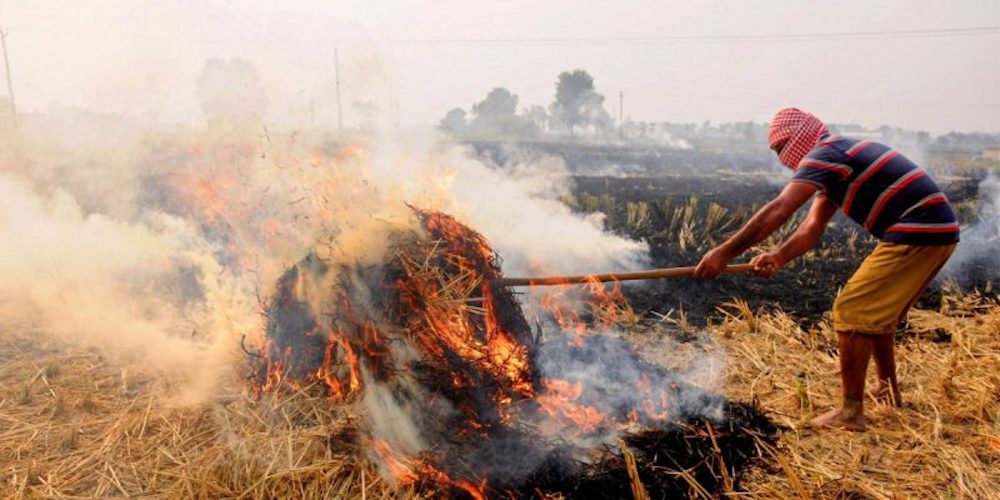Controlling Paddy Residue Burning

Commission for Air Quality Management in NCR and Adjoining Areas (CAQM) is regularly reviewing the position with Chief Secretaries of Punjab, NCR (National Capital Region)State Governments, Agriculture/ Environment Secretaries and Pollution Control Boards (PCBs) to contain the problems arising out of farm fire incidents in the National Capital Region (NCR) and Punjab.
The review meetings were also held recently with 23 District Collectors / District Magistrates (DMs) of Punjab, 22 DMs/ DCs of Haryana, and 8 DMs/ DCs of NCR Districts of Uttar Pradesh (U.P.) regarding the preparedness and implementation of action plan for Prevention and Control of Paddy Straw Burning in 2022.
During the review meetings, the DCs/ DMs briefed about their preparedness and informed that they have conducted meetings at their levels as well as with the nodal officers and will ensure that there is a substantial reduction in the number of stubble burning cases in their respective districts.
Further, the DCs elaborated the steps taken regarding utilization of available machinery, IEC activities especially in all hotspot villages, extending assistance to the ex-situ projects in their districts, interaction with the farmer communities and further informed that they are keeping strict vigil on the burning incidences. Haryana, Punjab and U.P. assured that with effective implementation of action plan, utilization of the CRM machinery, effective public campaign and strict enforcement, they would ensure substantial reduction in crop burning incidents this year.
It was noted that about 31,700 Custom Hiring Centers and cooperatives have been set up in Punjab, Haryana and UP (NCR) and more than 2 lakh CRM Machinery is available for utilization in Punjab, Haryana and NCR Districts of U.P. The need to intensify IEC activities like educational campaigns, awareness camps and publicity through print, electronic and social media was emphasized.
The State Governments were advised that the monitoring/enforcement mechanism as envisaged in the plan of action at the State level/ District level/ Sub-divisional level/ Cluster and Village level must be effectively utilized.
The Commission has been actively monitoring paddy residue burning events for a month now i.e. from 15th September 2022 onwards in the states of Punjab, Haryana and 8 NCR Districts of U.P. The current year has so far seen a reduction from 3431 to 1695 fire counts as compared to the corresponding period of last year.
The total farm fire incidents reported in Punjab are 1444 as against 2375 incidents in 2021, in Haryana are 244 as compared to 1026 in the previous year, and in U.P. (NCR) are 05 as against 30 fire incidents during the corresponding period of 2021. In NCT of Delhi, 02 fire incidents have been reported this year. No fire incident has been reported from the two NCR Districts of Rajasthan. During the current harvesting season, the first paddy residue burning incident was reported on 15th September in Punjab, on 18th September in Haryana, on 30th September in the NCR Districts of Uttar Pradesh and on 05th October in Delhi.
Incidentally, the Central Government has taken various steps to tackle the issue of stubble burning and a large quantity of paddy straw is now being managed through in-situ and ex-situ management options. Statutory directions have been issued to thermal power plants to co-fire biomass based Pellets, Torrefied Pellets/Briquettes (with focus on paddy straw) with Coal (up to 5-10%) and to industries operating in NCR other than GNCT of Delhi to switch over to PNG or biomass fuels during 2022.
These have led to a large demand for biomass based pellets, though supply is on the lower side due to slow/ limited growth of aggregators/ suppliers. Thus, CPCB guidelines would bridge a crucial gap in the biomass supply chain.
The guidelines give preference to units proposing to install equipment that is made in India. Preference is also given to those units which have agreement with farmers located in NCT of Delhi, States of Punjab and Haryana and NCR districts of Rajasthan and Uttar Pradesh, to ensure assured supply of paddy straw.
Under CPCB guidelines, individuals/entrepreneurs/ companies, interested in setting up pelletisation and torrefaction plants, using only paddy straw generated in the NCT of Delhi, States of Punjab & Haryana, and NCR districts of Rajasthan & Uttar Pradesh can submit an application for obtaining a one-time grant on capital investment.
A maximum grant of Rs. 14 lakh per Ton/hr for non-torrefied pellet plant and Rs. 28 lakh per Ton/hr for a torrefied pellet plant is being provided under the guidelines, with an overall cap of Rs. 70 lakhs for the former and Rs. 1.4 crore for the latter. A corpus of Rs. 50 crores has been earmarked for utilisation through the guidelines.
Assuming complete utilization of the corpus, over 1 million metric tonnes of paddy straw based pellets are expected to be generated every year. With supplemental efforts by other stakeholders, the guidelines are expected to enhance paddy straw utilization in power plants and industries, catalyse rural economy and further the spirit of entrepreneurship.



